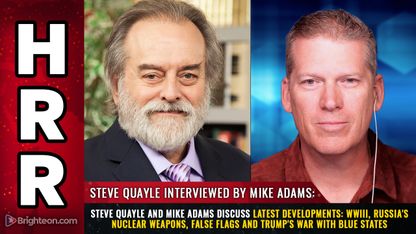
(Article by Cindy Harper republished from ReclaimTheNet.org)
With its recent premiere, both online and in theaters across the US, Dinesh D’Souza’s chilling production digs into the deeply troubling evolution of an escalating police state targeting the common citizen; the unprecedented political persecution orchestrated under the Biden regime is uncloaked for all to see. Thousands eagerly tuned in – made possible by a partnership with Dan Bongino – as the true extent of this political downfall began to unfold.
Dinesh D’Souza paints a stark image of the America of today, describing it as “a scary place to live, a chilling take on the reality of a fast-approaching police state,” during a discussion with The Gateway Pundit’s Jim Hoft.
At the Police State’s Mar-a-Lago premiere recently, Hoft shared his encounter with D’Souza. Afterwards, startling news revealed that the US Government had blocked a transaction to the Salem Media Group by the producers of “Police State.”
The revelation of the agency involved was even more shocking: the very same department that tracks terrorism and narcotics trafficking.
The Financial Crimes Enforcement Network of the US Department of the Treasury, had abruptly “intercepted” a $106,000 payment intended to purchase ads for D’Souza’s film, as he told Newsweek.
Engaging in such activities is no small inconvenience for D’Souza and his team. Although the Treasury Department remains silent on their actions, the delay has already begun to create waves and provide a real-time example of the content pointed out in the film.
The agency renowned for enforcing economic sanctions and monitoring assets primarily against terrorist cells and narcotics traffickers, The Office of Foreign Assets Control (OFAC), has taken an unprecedented interest in a local matter. On the latest concerning OFAC’s actions, D’Souza expresses his surprise at the censorship act against Police State: “Is this some kind of a bureaucratic police State tactic to tie up our funds without explanation?”
OFAC’s duties ordinarily concern foreign transactions, not such benign domestic affairs like film ad buys. In the face of OFAC’s unresponsiveness, Dinesh remained hopeful while expressing concern over possible censorship and financial disruption tactics used against his film. This incident vividly demonstrates an alarming reality where production money for a documentary on democratic values can get tangled in the webs usually reserved for criminal enterprises.
This story has a happier end, however. The seized funds were returned to D’Souza by late afternoon. Still, the shockwave of this seemingly arbitrary act of alleged retaliation remains, echoing eerily like a scene straight out of the film itself.
Read more at: ReclaimTheNet.org
Please contact us for more information.

















